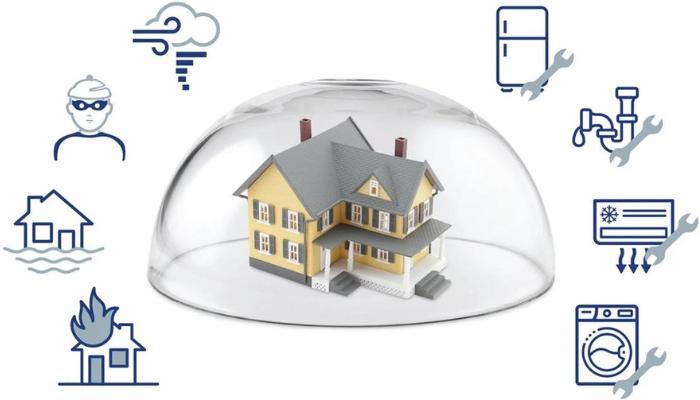The Best Home Insurance in the United States
Protecting your home is one of the most important measures you can take to ensure your family’s safety and peace of mind. Home insurance offers this protection, covering a wide range of risks that can affect your property and belongings.
From fires and thefts to electrical damage and natural disasters, comprehensive home insurance gives you confidence that in the event of the unexpected, your financial security will be protected. However, choosing the ideal home insurance can be a challenging task, given the variety of options available on the market.
In this in-depth review, we’ll look at the key aspects to consider when selecting home insurance, from assessing your individual needs to comparing coverage offered by leading providers.
With this information in hand, you will be prepared to make an informed choice that meets your specific needs and ensures adequate protection for your home.
What is Home Insurance?
- Fire protection: Ensures the safety of your property and belongings against damages caused by fire.
- Theft or burglary protection: Provides compensation for losses resulting from theft or qualified burglary.
- Civil liability: Ensures financial protection in cases of damage to third parties within your property.
- Electrical damage protection: Coverage for damages caused by short circuits or electrical overloads.
- 24-hour assistance service: Emergency support, such as locksmith, plumber, and electrician.
Why is having Home Insurance Important?

Having home insurance is not just about fulfilling a legal requirement; it’s about protecting your most valuable asset and ensuring peace of mind.
Imagine the stress and financial burden of coming home to find a significant issue like a water leak that has damaged your furniture or a burglary that has resulted in the loss of your valuable electronics.
Without the safety net of insurance, the financial impact of these events can be overwhelming. Let’s delve into the key reasons why home insurance is indispensable:
- Financial Protection: Coverage against unexpected events that can result in high repair or replacement costs.
- Peace of Mind: Knowing that your home is protected allows you to live with more tranquility, free from constant worry about potential accidents or unforeseen circumstances.
- Property Value Enhancement: Insured properties are more valued in the market, providing buyers with the assurance of acquiring a protected property.
- Emergency Assistance: Services that swiftly resolve everything from minor inconveniences to major emergencies.
- Asset Coverage: Protection not only for the residence itself but also for the belongings within it.
Investing in home insurance is investing in security and peace of mind.
Comparison of the Best Home Insurance in the United States
Choosing the ideal home insurance can be challenging due to the wide range of options in the market. Below, we present a comparison of the main available insurances.
State Farm
Get to know State Farm, one of the most renowned insurers in the United States, offering a wide range of coverage to protect your residence.
Coverage: Fire, theft, electrical damage, storms, liability, among others.
Network: Extensive network of service providers nationwide.
Price: Variable, depending on selected coverages and customer profile.
Additional Benefits:
- 24-hour assistance
- Home repairs
- Legal guidance
- Discounts on partner services
Allstate
Part of the Allstate group, this insurer offers various coverage options for residences, with additional benefits.
Coverage: Fire, theft, electrical damage, storms, liability.
Network: Extensive network of service providers nationwide.
Price: Competitive, with several customization options.
Additional Benefits:
- 24-hour home assistance
- Locksmith, plumber, electrician services
- Coverage for portable equipment
Liberty Mutual
Liberty Mutual is one of the largest insurers in the United States, offering customizable plans and comprehensive coverage for residences.
Coverage: Fire, theft, electrical damage, storms, liability.
Network: Solid network of service providers nationwide.
Price: Variable, with customizable options for different profiles.
Additional Benefits:
- Emergency services
- Assistance for minor repairs
- Security consulting
Farmers Insurance
Farmers Insurance is a reliable option for those seeking security and protection for their home, offering personalized solutions and specialized service.
Coverage: Fire, theft, electrical damage, storms, liability.
Network: Extensive network of service providers nationwide.
Price: Competitive, with several customization options.
Additional Benefits:
- 24-hour assistance
- Locksmith, plumber, electrician services
- Legal guidance
USAA
USAA is an international insurer with a strong presence in the United States, known for its comprehensive coverage and efficient service.
Coverage: Fire, theft, electrical damage, storms, liability.
Network: National network of service providers.
Price: Competitive, with a focus on quick and efficient service.
Additional Benefits:
- Comprehensive home assistance
- Legal guidance
- Preventive maintenance services
Nationwide
Part of the Nationwide group, this insurer offers residential insurance options with good coverage and additional benefits.
Coverage: Fire, theft, electrical damage, storms, liability.
Network: Extensive network of service providers nationwide.
Price: Variable, with affordable options.
Additional Benefits:
- 24-hour assistance
- Locksmith, plumber, electrician services
- Coverage for portable equipment
American Family Insurance
American Family is a global insurer with a strong presence in the United States, offering a wide range of coverage and additional benefits.
Coverage: Fire, theft, electrical damage, storms, liability.
Network: Extensive network of service providers nationwide.
Price: Variable, with flexible options for different profiles.
Additional Benefits:
- Home assistance
- Legal guidance
- Emergency services
How to Choose the Best Home Insurance?
Choosing the ideal home insurance can be challenging, but with some simple guidelines, it’s possible to make an informed decision tailored to your unique needs. Here are some detailed guidelines to guide you through this process:
1. Assess Your Needs
Before opting for home insurance, it’s essential to analyze your specific needs. Take into account:
- Residential Location: The area where you live can influence the types of coverage you need. For instance, if you reside in a flood-prone area, it’s important to include coverage for natural disasters.
- Property Type: Houses, apartments, and commercial properties may have different coverage needs. Ensure the chosen plan is suitable for the property type.
- Value of Assets: Take inventory of your most valuable assets and ensure the policy provides adequate coverage to replace these items in case of a claim.
2. Compare Coverages
When comparing home insurance policies, don’t just focus on the price. It’s crucial to understand precisely what each policy covers. Here are some aspects to keep in mind:
- Basic Coverage: Ensures protection against fire, lightning, explosion, and aircraft fall.
- Additional Coverages: Include electrical damage, strong winds, hail, vehicle collisions, and natural disasters, among others.
- Exclusions: Make sure to check which events are not covered by the policy to avoid unpleasant surprises.
3. Check the Insurance Company’s Reputation
When choosing home insurance, the insurer’s reputation plays a crucial role. Here are some ways to evaluate it:
4. Consider Additional Benefits
5. Read the Terms and Conditions
Before finalizing the insurance policy, it’s crucial to thoroughly examine all the terms and conditions of the policy. This includes:
- Waiting Periods: Understanding waiting periods can prevent frustrations, as some coverages may not be immediately available after signing the contract.
- Deductibles: Check the deductible amount, which is the sum you need to pay in case of a claim before the insurer covers the rest.
- Coverage Limitations: Identify any limitations that may affect the effectiveness of coverage, such as payment caps or specific exclusions.
Home Insurance Waiting Time
Understanding the grace period on home insurance is crucial to ensuring you are protected when you need it most. The waiting period denotes the interval after contracting the policy in which certain coverages are not yet in force.
Let’s examine the concept of deficiency, understand its reason for existing and assess its impact on your coverage.
What is Grace Time?
Grace Period is the initial interval after purchasing insurance in which some coverage does not apply. It serves as a protection measure for the insurance company against possible fraud.
Why is there a grace period?
The grace period aims to prevent people from taking out insurance only when they know they will need to use it immediately, such as in situations of imminent risk of loss.
Types of Home Insurance Waiting Period
There are a variety of grace periods, which vary depending on coverage:
- Grace period for Electrical Damage: The waiting period may vary from 15 to 30 days.
- Grace period for Theft Coverage: Typically 30 days.
- Waiting period for Fire Coverage: There is generally no waiting period, but this may vary depending on the insurer.
Tips for Dealing with Waiting Time
Managing the waiting period on your home insurance can be complicated, but some strategies can help. Here are some tips for navigating this time and ensuring your coverage is ready when you need it most.
- Anticipate: Don’t wait for an imminent problem to purchase insurance.
- Familiarize yourself with the Terms: Read the policy carefully to understand the specific conditions.
- Maintain Regular Maintenance: Prevent problems that could result in claims during the grace period.
Which Home Insurance to Choose?
Your home insurance selection should be based on a thorough analysis of your individual needs and the options offered on the market. Below are some final tips to help with decision making:
- Prioritize Coverage: Choose insurance that covers the main risks of your property, such as fires, thefts, natural disasters and accidental damage.
- Consider the Cost-Benefit: The cheapest insurance is not always the best; evaluate the balance between price and benefits. Comprehensive coverage can bring more peace of mind.
- Evaluate Service: Good service can make a difference in times of emergency. Research the insurer’s reputation for customer service and speed in resolving claims.
- Consult a Broker: Specialized professionals can help you find the best option for your profile, customizing the policy according to your specific needs.
In conclusion, selecting the right home insurance demands careful consideration of individual needs, available options, and insurer reliability. Prioritizing coverage, balancing cost-effectiveness, assessing service quality, and seeking expert advice can lead to a well-informed decision tailored to your requirements.





